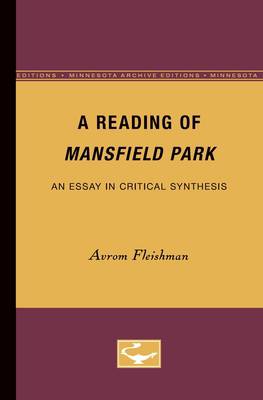
- Afhalen na 1 uur in een winkel met voorraad
- Gratis thuislevering in België vanaf € 30
- Ruim aanbod met 7 miljoen producten
- Afhalen na 1 uur in een winkel met voorraad
- Gratis thuislevering in België vanaf € 30
- Ruim aanbod met 7 miljoen producten
Zoeken
€ 47,95
+ 95 punten
Omschrijving
A Reading of Mansfield Park was first published in 1967.Jane Austen's novel Mansfield Park has been examined in a number of scholarly contexts and has been vigorously debated according to divergent ethical and political views. In this new study of the work, Professor Fleishman provides a full and unified reading of the novel by employing methods and synthesizing insights drawn from several fields of knowledge - history and sociology, psychology, and cultural anthropology. By combining several perspectives within a single study, he attempts to avoid the pitfalls of partial readings.After an introductory discussion of his method in relation to current trends in literary criticism, the author reviews past criticism of Mansfield Park. In the chapters which follow he discusses the novel's historical background and its response to social, political, and economic issues of the day; the psychological structure of the characters and its bearing on an ethical evaluation of them; and the mythological parallels which, he finds, impart a sound framework and universal significance to the plot. In the final chapter he places the work within the tradition of English fiction, in an effort to estimate its enduring value.
Specificaties
Betrokkenen
- Auteur(s):
- Uitgeverij:
Inhoud
- Aantal bladzijden:
- 124
- Taal:
- Engels
Eigenschappen
- Productcode (EAN):
- 9780816604289
- Verschijningsdatum:
- 1/01/1967
- Uitvoering:
- Paperback
- Formaat:
- Trade paperback (VS)
- Afmetingen:
- 140 mm x 210 mm

Alleen bij Standaard Boekhandel
+ 95 punten op je klantenkaart van Standaard Boekhandel
Beoordelingen
We publiceren alleen reviews die voldoen aan de voorwaarden voor reviews. Bekijk onze voorwaarden voor reviews.











